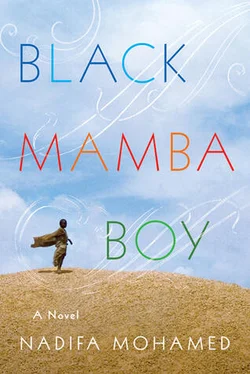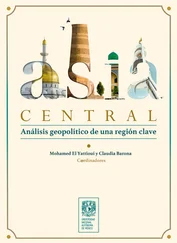He dreamed happy dreams, dreams in which he disembarked from the ship to find a grand black car crawling to a stop before him. The passenger door was clicked open by a suited arm, a solid gold watch ticking and beaming against the dark skin of the driver. All those promises his mother had made about him being the sweetheart of the stars looked to him as if they would finally come to pass. He was becoming a man and needed a father to light the way. Jama had so many questions for Guure. Where did you learn to drive? What is it like in Sudan? Why did you not come back for me? Jama felt ready to explode; his sentence was finally over.
The boat shook violently then steered away from the harbor; the wait had been interminable. Jama’s mouth tasted sour and his tongue was dry and cottony. He ate the lunch Amina had prepared for him, putting the cloth over his head against the sharp sunlight. The boat cut a clean line through the clear, green-tinged sea, gliding like a rich European dancer on the rooftops of Aden. The boat journey seemed too easy to Jama; he mistrusted ease and comfort. Jama concentrated on the shoreline, hoping to make out some landmark, something he would recognize from the stories he had heard from Idea, but he recognized nothing. Later, as the sun traveled to the west, painting broad sweeps of pink and orange and red and purple across the sky in its wake, islands appeared on the horizon. Islands ringed in fine white sand, the leaves of lazy-looking palm trees swaying heavily, the gentle coral reefs around them lashed by the dueling waves of the Red Sea and the Gulf of Aden. Jama counted seven small islands and realized happily that they were the seven wicked brothers. Idea had told him that they had been evil pirates whom God had caught in a raging storm and turned into islands to be forever whipped by the violent winds and waves of the Bab el Mandab Strait, the Gate of Tears.
ASSAB, ASMARA, AND OMHAJER, ERITREA, OCTOBER 1936
The passengers gathered their bundles and children while the crew ran around preparing for landing. Jama stood up and walked to the bow. After docking, a man in a vest announced, “Assab, Eritrea.” Jama had to keep pushing back the clamoring bodies behind him, who crushed him as they yelled to be let off. Finally, a gangplank was placed against the vessel and the gate released.
Jama followed the other passengers, mainly Afars returning to see family in Dankalia, but a few Somalis and Yemenis were mixed in with the crowd. Jama’s attention was caught by a gigantic board on two poles. A helmeted head with menacingly large nose and heavy lantern jaw in a white face were all Jama could make out in the growing darkness; European writing encircled the image. Jama noticed other men raising their right arm to the picture so he did the same, wondering why anyone would go to the effort of painting such an ugly Ferengi. Jama sidled up to a Somali man, barely distinguishable from the Afars apart from his shapely teeth that had not been filed Dankali-fashion. The Somali man looked askance at him. “Yes, boy?”
“Uncle, I am looking for a clansman, do you know an askari called Talyani?”
“Talyani? I know of one Issa man named Talyani but the devil knows where he lives, ask at the police station,” the man replied.
“What do you want? It’s too late to be begging, isn’t it?” shouted a voice behind the door.
“I was sent to you by Idea in Djibouti, I am his nephew, can you help me go to Sudan?” Jama said, his voice higher than normal. The heavy door was unlocked and Jama stepped in.
Talyani’s home was immaculately clean. Sitting on the floor was a young woman with a baby suckling at her breast; she gave a polite nod to Jama. “You can stay for a few nights. The boat to Massawa is due soon. This is my wife, Zainab, and my son, Marco.” Talyani was neck-achingly tall, he wore only a short sarong and his strong legs and hulking back were thatched with wiry black hairs.
“Get him something to sleep on when you’re finished, Zainab, and food, too. I’m going to bed.” Talyani disappeared into the dark hallway but then came back. “You’re his nephew, huh? On what side?”
Jama thought quickly. “On both sides. My mother is Amina’s half sister and my father is his brother.”
Talyani twisted up his eyebrows but let it go. “We’ll speak properly in the morning.”
Jama let out a long breath. He was lucky Talyani had not asked him to recite his grandfathers’ names. The house was silent, only the baby’s sucking disturbed the air, and Jama stood awkwardly near the door. Zainab moved quickly and quietly around the room, arranging blankets on the floor for him.
“Let me help,” Jama offered. Zainab shook her head, her hair falling across her face and casting a shadow, but he could pick out another shadow within it, the purple-black print of a fist around her eye.
While she laid out a plate of rice and stew, Jama gazed at her baby. Marco’s round cheeks were shiny and smooth, his little chin resting on the blankets he was coddled in, and he slept like a king without a care in the world. Jama ate in silence while Zainab fluttered around, fetching water and straightening furniture that was already straight. They could hear Talyani through the wall, clearing his throat and making himself comfortable, reminding them he was still there. The plates were quickly emptied and Zainab spirited them away, washing them immediately. She returned to pick up her baby and hesitated at the doorway.
“Is there anything else you need?” Her small face as she turned around was that of a teenager, with puppy fat and pimples.
“No, thank you,” replied Jama, wondering how much older than him Zainab was.
The room looked strange in the early-morning sun, bare and shiny, as if it had been licked clean. Black-and-white photographs of Talyani in the uniform of a colonial soldier, an askari, stood proud in varnished wooden frames, the schoolboy socks pulled high up toward his knees, a strange tall hat on his head. His hair was black and wavy like an Italian’s, hence his nickname. He was a smiling colonial mascot in costume and Jama couldn’t imagine him pouring sand into the engines of Italian trucks or spitting in their food the way he would. Talyani must be like the ones Idea mentioned, thought Jama looking at the pictures, the ones who gunned down the Abyssinian farmers and children.
Zainab became melancholic as the day of Jama’s departure approached. She told him he had been her first guest since she had arrived in Assab, and she envisioned a long stretch before anyone else came to visit. While Jama picked the stones from the rice or washed the vegetables for her, Zainab let slip little details about her life. She had been a market girl in Burao, and was planning to run away to Aden when Talyani proposed marriage. There was still something of the market girl about her; she spat regularly into the yard, swore and gesticulated extravagantly with her toothstick. She told him she had nearly forgotten what it was like to have someone to talk to and do things with. Her teenager’s life, with its cast of sisters, aunties, friends, and neighbors, had come to an abrupt end when she married, a sacrifice she had made without any real knowledge of what she was leaving behind. Her friends had been impressed with her bravery in leaving Somaliland and so had Zainab, until she realized that she was in thrall to a drunk and would only ever see the four walls around her and the ceiling above her head. Talyani, on the other hand, had freedom and a life in the outside world but he was rude and patronizing to their Afar neighbors, families who were largely opposed to the Italian invasion of their country. Talyani sang Italian songs loudly in the backyard and had taken to giving the Fascist salute to passersby. If it wasn’t for the baby, Zainab would have stowed away on one of the steamboats and hotfooted it back to Burao.
Читать дальше
Конец ознакомительного отрывка
Купить книгу












